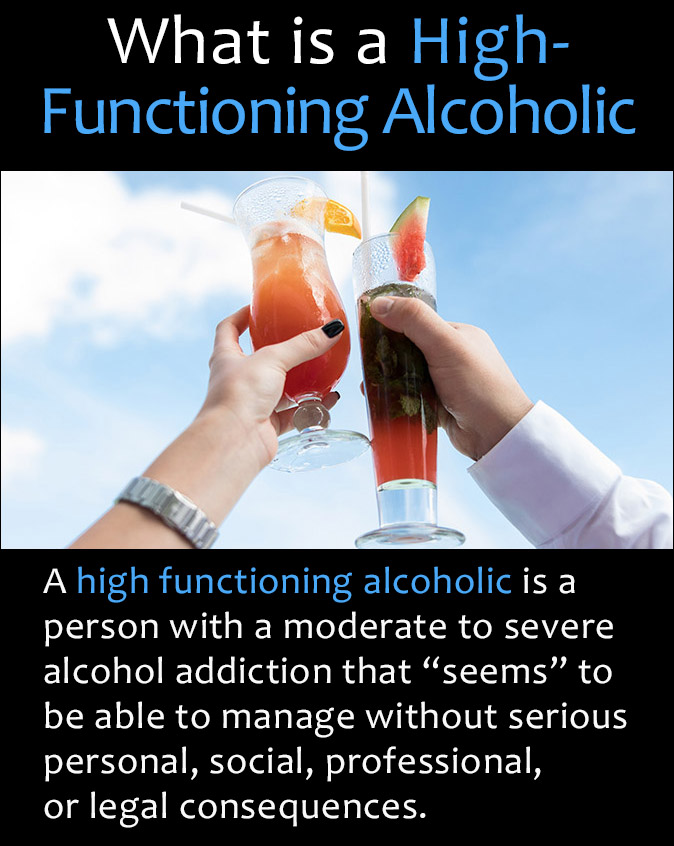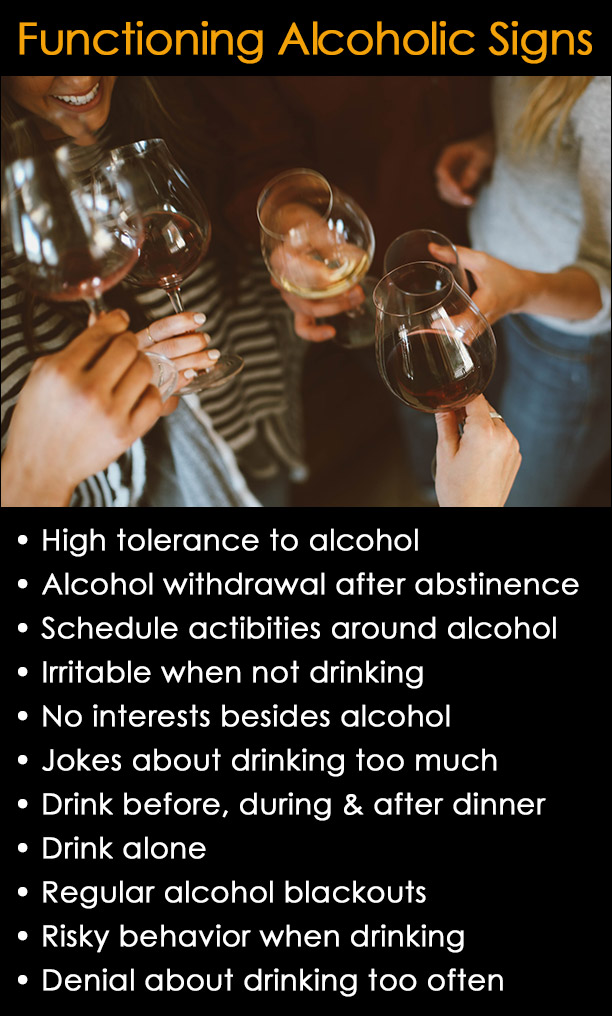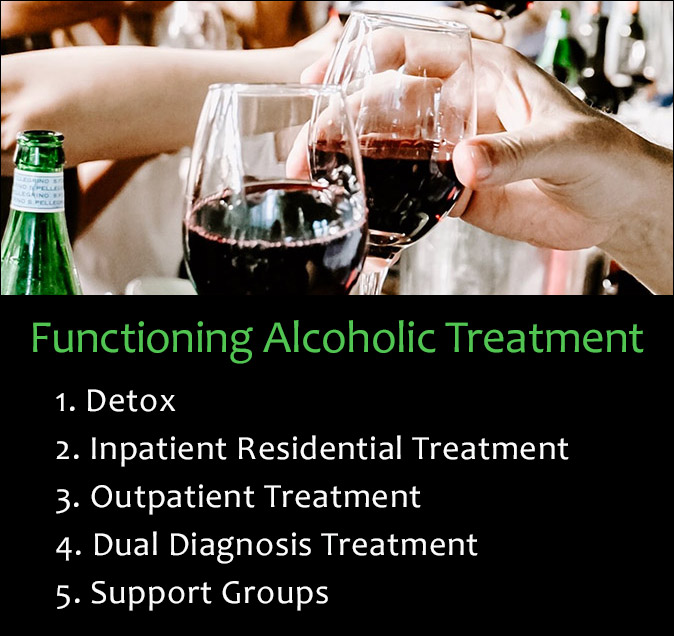
It’s easier than people think to develop an alcohol use disorder (AUD) or become a high functioning alcoholic or functional alcoholic.
Regular alcohol use, even when it wavers on abuse, is a socially accepted part of American life.
People regularly attend events that include alcohol, such as work conferences, holiday office parties, sporting events, and concerts. Add to that the many family or social gatherings that are centered around drinking.
Excessive alcohol use or “heavy drinking” is considered to be 15 drinks or more a week for men and eight or more drinks a week for women, according to the Centers for Disease Control and Prevention (CDC).
Binge drinking is the act of consuming five or more drinks in one sitting for men and four for women.
Society normalizes the use alcohol in many settings so becoming a functional alcoholic does not have the same stigma attached to it as most forms of drug use.
What Does it Mean to be a High Functioning Alcoholic?
Though it’s not an official diagnostic term, a high functioning alcoholic is defined as a person with a moderate to severe alcohol addiction that “seems” to be able to manage without serious personal, social, professional, or legal consequences. At least for the time being.
The National Institutes of Health (NIH) suggests that nearly 20 percent of those with an alcohol use disorder are what they term the “functional alcoholic subtype.”
According to the NIH, a functioning alcoholic is generally a middle-aged adult who is well-educated and has a stable family and career.

Some people with an alcohol use disorder spiral out of control, either quickly or over time, suffering incredibly severe consequences from alcohol abuse.
These individuals often face the stigma associated with the stereotypical “down and out alcoholic” and might be incorrectly considered a lost cause.
Those who fall into the category of a functioning alcoholic appear on the surface to lead a regular life.
They may seem physically healthy, be able to balance family matters and friendships, and even excel in their careers.
Despite the apparent lack of negative signs or consequences, a functioning alcoholic often develops an addiction or alcohol use disorder.
Addiction is one of many types of mental illness that affects a person’s mood, decision-making, and behavior in unhealthy ways.
Signs of a Functioning Alcoholic
The signs of a functioning alcoholic may not be as obvious as those with severe alcoholism, so they are much less likely to seek help.
They feel things are under control and may be in complete denial that they have a drinking problem.
Relationships with a functioning alcoholic can be problematic, especially if one person is sober. Alcoholism can put a strain on a marriage and regular drinking leads to a breakdown in communication.
Apart from regular, excessive alcohol consumption, there are other factors that can put a person at risk of becoming a functional alcoholic.
People struggling with anxiety, depression, past trauma, or other mental health issues may use alcohol to self-medicate or cope with the symptoms of these and other conditions.
Genetics and a family history can also play a role. If a parent or family member had an alcohol use disorder, it can increase the chances of developing the same issues.
According to the National Institute on Alcohol Abuse and Alcoholism (NIAAA), research shows that genetics is responsible for about 50% of the risk for developing an alcohol use disorder.

Signs of a High-Functioning Alcoholic include:
- Very high tolerance to alcohol because of excessive drinking
- Moderate to severe alcohol withdrawal symptoms after a short period of abstinence
- Habitually schedule social or professional engagements around drinking alcohol
- Agitation or irritability when the regular drinking schedule is disrupted by work, family, or other situations
- Lack of hobbies, interests or friends that don’t involve alcohol
- Casual jokes about “drinking too much” or “too often”
- Regularly consuming alcohol before, during, and after dinner
- Frequently drinking alone or preferring to drink alone
- Getting blackout drunk makes it difficult to remember parts of the previous evening
- Engaging in risky behaviors like drinking and driving, drinking while at work, or sexual promiscuity while intoxicated
- Denial of a problem when confronted by family, friends, or co-workers
- Anhedonia or not being able to enjoy activities that were once enjoyable
Denial is a challenge for a functioning alcoholic because they can point to their successful jobs, relationships, and lack of alcohol-related problems. However, overcoming denial is not impossible.
How to Deal with the Denial of a Functional Alcoholic
Denial plays a big role in the attitude and perception of a drinking problem, especially in the beginning before negative issues appear.
The short-term effects of alcohol on the brain and body may not pose a serious problem, but over the long-term, functional alcoholics will experience more serious negative physical and mental consequences.
When this happens, denial loses some of its grip on a person’s views.
Chronic alcohol abuse takes a heavy toll on the body, leading to many types of health issues. It also disrupts a person’s brain chemistry, making them more susceptible to mental health conditions.
It’s not always easy, especially in the early stages, to convince a functional alcoholic that their choices are unhealthy, damaging, and dangerous.
Whether or not a person can break through their denial ultimately depends on them. But constructively expressing concern, a willingness to listen, and offering nonjudgmental support can be effective.
Always be supportive and never confrontational when pointing out your concern about another person’s drinking habits.
It is also necessary to set clear boundaries about how drinking is subtly affecting their home life, relationships, and any other consequences that may or may not seem substantial to them.
Finally, loved ones can send a clear message that they do not support their drinking, distance themselves with love, and urge an individual to seek alcohol addiction treatment.

How to Help a High Functioning Alcoholic
It’s necessary to show compassion and support for a functioning alcoholic to gain their trust and show you want to help.
Let them know you care about their health and will be with them through recovery, but they need to make a change. Be firm and don’t back down, as hard as it may be.
High functioning alcoholic recovery is achievable through proper treatment. Work with them to find a program that best fits their needs.
Alcohol addiction treatment will vary based on a person’s individual situation and needs.
The most common forms of treatment include:
- Detox
- Inpatient Residential Treatment
- Outpatient Treatment
- Dual Diagnosis
- Support Groups
Medical detox is often the first phase of recovery to manage withdrawal symptoms before beginning a formal addiction treatment program. Detox usually lasts 7 to 10 days depending on the nature and severity of addiction.
After detox is completed, an inpatient residential program offers a structured environment that lasts for 30 days or more.
The individual lives at the treatment facility to understand the reasons behind their drinking and learn techniques to avoid cravings, triggers, and relapse.
Some people respond well to the independence of an outpatient program. This offers patients the opportunity to continue their life mostly uninterrupted while still receiving the necessary therapy for recovery.
Outpatient treatment might be a good option for high functioning alcoholics because they seem to be in control of their life enough to continue working while in recovery.
For others who have a co-occurring mental health issue like depression, a dual diagnosis treatment program that provides a supportive and healing atmosphere away from their normal daily stressors is recommended.
Support Groups are helpful during recovery for both inpatient and outpatient programs. Community support groups like AA are also beneficial as an aftercare approach when a formal treatment program has been completed.
Though it may be difficult for people to understand in the beginning, living a life in recovery without alcohol can be far more rewarding than ever imagined.
Even though a person may be coping as a functioning alcoholic, there is a chance it will develop into something more serious that could cause other health or social problems in the future.
Getting it under control early is a key to successful recovery.
Functioning Alcoholic FAQs
Can a high functioning alcoholic change?
Yes, it’s possible for a high functioning alcoholic to change and recover through proper treatment and support.
Overcoming the denial of a drinking problem may be one of the hardest parts of changing.
Understanding that alcohol is causing problems with health, family, friends, and work can be a powerful motivating factor for seeking treatment to change.
How does denial affect high functioning alcoholic treatment?
Denial is a major obstacle to alcohol recovery, and it can cause a person to avoid or delay seeking treatment.
If a person is in denial when they enter a treatment program, recovery may take longer to be effective, or it may not be successful if they hold on to those beliefs during and after treatment.
However, if a person admits they are an alcoholic and wants to stop drinking, it will have a positive impact on treatment and recovery. Admitting alcohol is problem is half the battle of recovery.
Being open, honest, and motivated to become sober will help to fully engage in therapy, support groups, and relapse prevention techniques.
What are concerns about high functioning alcoholics and relationships?
If both people in a relationship are regular drinkers, they share a common lifestyle trait that may not be a major burden.
On the other hand, when one person is a drinker and the other person is not, it can put a strain on the relationship and become a problem for both.
This can create unhealthy issues with trust, communication, and intimacy. It can be especially problematic if one person isolates from the other to drink, or the sober person creates a distance to stay away from alcohol and drinking.
If problems arise and the functional alcoholic does not find a way stop drinking, it can weaken the long-term health and survival of the relationship.
What problems are caused by living with a functional alcoholic?
Changes in mood and behavior when a person is drinking sometimes creates a toxic environment for a spouse or other family members. This may lead to physical or emotional abuse.
Codependent behavior is common when one person tries to meet the needs of the other, while sacrificing their own needs for the sake of gaining approval or validation from the other.
Even though a high functioning alcoholic may be in control at work, responsibilities at home can suffer at the expense of a spouse or children.
If work becomes unmanageable, it can create financial problems and instability at home for the entire family.
Related Posts
- High-Functioning Anxiety Symptoms and Treatment
Anxiety disorders are the most common form of mental illness in the United States. They…
- 8 Famous People Who Kicked Their Cocaine Addiction
People are often influenced by the rich and famous, and sadly that can mean normalizing…
- Is Addiction a Disease or a Choice?
Is addiction a disease? Is alcoholism genetic? Or is it simply a personal choice? These…
